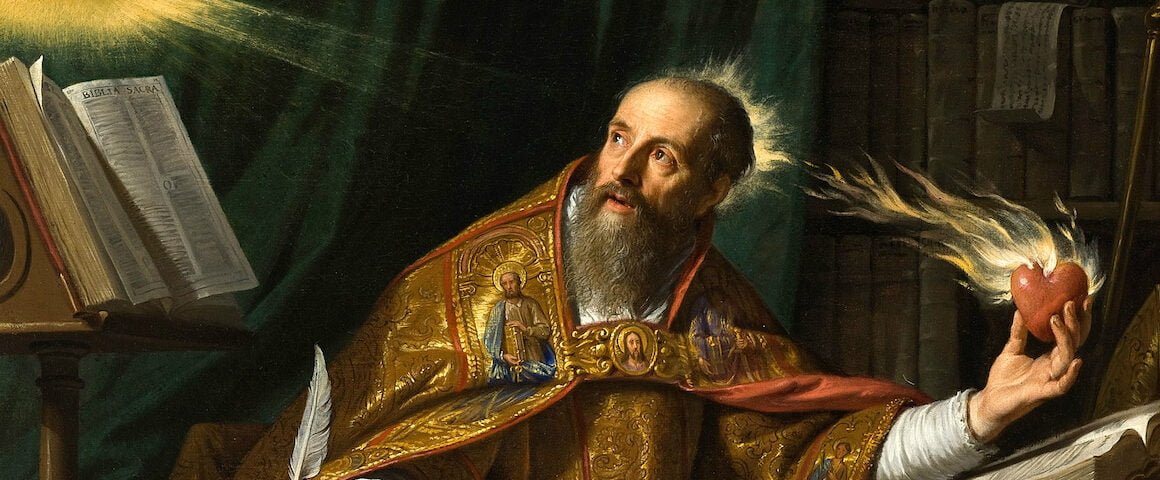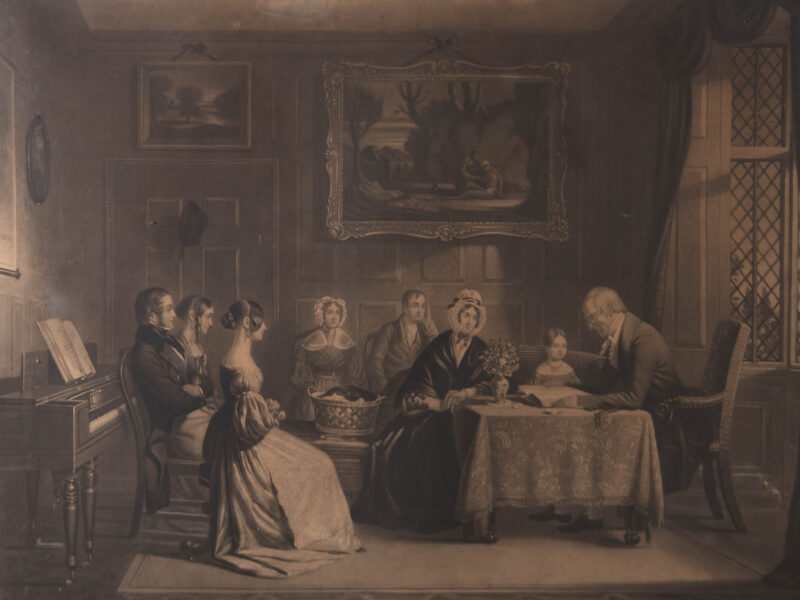II. The Humanist Roots of Christian Education
If humanism is to be primarily understood as a return to the classical sources, then the life, conversions, and writings of St. Augustine provide an interesting case study of an individual whose classical education was fully realized in light of the Gospel. Many Christian parents may pause at the idea of exposing their children to pagan literature. After all, should not the study of Scripture serve as a basis for all Christian education? What role can pagan literature have in fortifying children against heresy?
Augustine could arguably be categorized as the first classical Christian student. Of all the fathers of the Church, Augustine’s high view of Scripture and divine revelation, when joined to his keen understanding of human nature, contributed not only “profound and lasting formulations of the human person, but […] the very mode by which such profound and lasting contributions can be made.”[1] From his introspective, personal reflection in The Confessions to his philosophy of education in De Doctrina Christiana, Augustine marries secular learning to Christian truth in an unprecedented way. And though his works were not explicitly commended by Renaissance Humanists, they work as a bridge of sorts, providing classical Christian parents and educators with an eloquent apology for the studia humanitatis.
In De Doctrina Christiana, Augustine states his apology for the Christian study of pagan texts. Not only does he emphasize that the fear of the Lord is the beginning of wisdom,[2] but that Wisdom is in fact the person of Jesus Christ, who “condescended to adapt Himself to our weakness, and to show us a pattern of holy life in the form of our own humanity.”[3] Words, and more importantly, the Word, are central to man’s understanding of himself and his place in the world. Augustine refers to God as a great Physician, whose treatment for all human beings is the wisdom he provides, “itself both doctor and medicine.”[4] Because man fell through pride, humility is the prescribed cure. Man’s innate hunger for knowledge cannot be fulfilled apart from God. The pagans, though they “knew God did not glorify him as God or give thanks, but became enfeebled in their own thoughts and plunged their senseless minds into darkness.”[5] Nevertheless, Augustine believes the wisdom of the past can and should be plundered:
Like the treasures of the ancient Egyptians […] all the branches of pagan learning contain not only false and superstitious fantasies and burdensome studies that involve unnecessary effort […] but also studies of liberated minds which are more appropriate to the service of the truth, and some very useful moral instruction.[6]
Then such learning may be applied to its “true function,” preaching the Gospel.[7] Whereas man may have before only glimpsed the truth through a glass dimly, he may now know truth fully, face to face.
David P. Fleischacker’s article, “Augustine: Foundations in Christian Humanism,” purports that Augustine’s training in the liberal arts, and particularly his understanding of wisdom, eloquence, and virtue, prepared him to make this robust apology for humane education. Augustine was inflamed for truth when he first picked up Cicero at eighteen, “but seeking truth and being through sensory and imaginative operations was futile.”[8] While attempting to properly order his desires,[9] Augustine found himself perpetually ensnared by his own interiority, as his “disordered desires terminated in the material realization of the desire.”[10] For all his learning, he did not possess the knowledge or will to free himself from himself. The asceticism of the Manichean heresy yielded similar frustrations. Augustine cites a particular moment of illumination in his conversion memoir, The Confessions:
… Suddenly I heard the voice of a boy or a girl-I know not which-coming from the neighboring house, chanting over and over again, “Pick it up, read it; pick it up, read it.” […] I could not but think that this was a divine command to open the Bible and read the first passage I should light upon. […] I snatched it up, opened it, and in silence read the paragraph on which my eyes first fell: “Not in rioting and drunkenness, not in chambering and wantonness, not in strife and envying, but put on the Lord Jesus Christ, and make no provision for the flesh to fulfill the lusts thereof.” I wanted to read no further, nor did I need to. For instantly, as the sentence ended, there was infused in my heart something like the light of full certainty and all the gloom of doubt vanished away.[11]
It is no accident that God utilized the texts of Holy Scripture to soften Augustine’s heart and illumine his mind. Paul’s command in Romans 13 to “put on Christ” becomes a basis for Augustine’s theory of education in De Doctrina Christiana, for discovering the reality of one’s nature in light of Christ leads to the proper ordering of his loves toward Wisdom himself. Because human beings are created in God’s image, they have an “unrestrictedness which cannot be completed or perfected by anything finite.”[12] In Christ, “all desire will be subservient to the mind that sees God and to the will that loves God and is obedient to him. Nothing will be wanting.”[13] The human heart is, indeed, restless until it finds its rest in Him. Augustine understood how words were central to man’s understanding of The Word.
And his foundation in the classical texts gave him a firm foundation to become a Christian apologist for what is now known as classical education.
Notes
- David P. Fleischacker, “Augustine: Foundations in Christian Humanism,” A Companion to Medieval Christian Humanism: Essays on Principal Thinkers. ed. John P. Bequette, 2016, 11. ↑
- Augustine, De Doctrina Christiana: Liber Secundus, trans. R.P.H. Green, Oxford Scholarship Online: 2004, part 67. ↑
- Augustine, De Doctrina Christiana: Liber Primus, part 23. ↑
- Ibid., part 27‒29. ↑
- Augustine, De Doctrina Christiana: Liber Secundus, part 91. Augustine alludes to Romans 1. ↑
- Ibid., part 125. ↑
- Ibid. ↑
- Fleischacker, 15. ↑
- Or “loves.” ↑
- Fleischacker, 15. ↑
- Augustine of Hippo, Albert C. Outler, “Chapter XII,” Augustine: Confessions and Enchiridion, 1955, 29. ↑
- Fleischacker, 27. ↑
- Ibid., 30. ↑





'“Fare Forward”: The Influence of Christian Humanism on the Classical Christian Education Movement (Part 2 of 4)' has no comments
Be the first to comment this post!